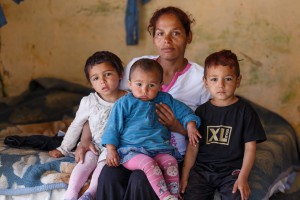 Our Finnish member Helsingin Diakonissalaitos (Helsinki Deaconess Institute – HDL) has published a study on key barriers to Roma participation at the level of an individual municipality called Valea Seacǎ, Romania. The report pays particular attention to the gender dimension of Roma inclusion, exploring the power relation between men and women within the community, as well as general access to education, health, housing and identity documents.
Our Finnish member Helsingin Diakonissalaitos (Helsinki Deaconess Institute – HDL) has published a study on key barriers to Roma participation at the level of an individual municipality called Valea Seacǎ, Romania. The report pays particular attention to the gender dimension of Roma inclusion, exploring the power relation between men and women within the community, as well as general access to education, health, housing and identity documents.
The study presents a valuable glimpse into the Roma inclusion process and key obstacles, whilst also setting the stage for a local project on empowering Roma women and other vulnerable persons. One of those is Ioana.
Ioana lives in Romania, in a village called Valea Seaca. The 31-year old Roma woman is expecting her fourth child. Ioana doesn’t know when the baby is due; she hasn’t received any prenatal care.
Ioana doesn’t remember much about her own childhood. She was born in a family with 8 children. Her parents were poor and couldn’t raise her so she grew up living in an orphanage.
Two of Ioana’s children don’t have any piece of identity. When Ioana was giving birth she didn’t have her own identity documentation with her. Registering the children after that has not been possible as it would be too expensive.
The situation of Ioana’s children is quite common in Romania. Thousands of Roma people have not been registered at birth and now live without documentation. This problematic situation creates multiple obstacles for Roma women with children, and strengthens inequality that pushes them into extreme poverty and economic dependence on their partners. Women without identity documents face a particularly high risk of social exclusion and exploitation.
With no documentation, it is very difficult for the children to get education or receive medical care. The families will not receive any benefits and have no right to social services. This makes it even more difficult for the poor families.
”I just wish health for my children. I wish they had the opportunity to go to school. I wish to feed them so I can have them with me. I don’t want to give them to the child care services” Ioana says.
The Helsinki Deaconess Institute is running a joint project with the Helsinki Parish Union. The project takes place in Valea Seaca village in Romania and aims to improve the living conditions of Roma people. The local partner is a NGO called E-Romnja, the first NGO of Roma women in Romania. The project aims to support especially the women and children of the community.
The project helped Ioana through her trial. She is currently waiting for the court decision, after which the birth certificates procedure can be started.
Find the Empowerment and Participation – Grassroots Democracy by Roma and Non-Roma Women study here (EN).